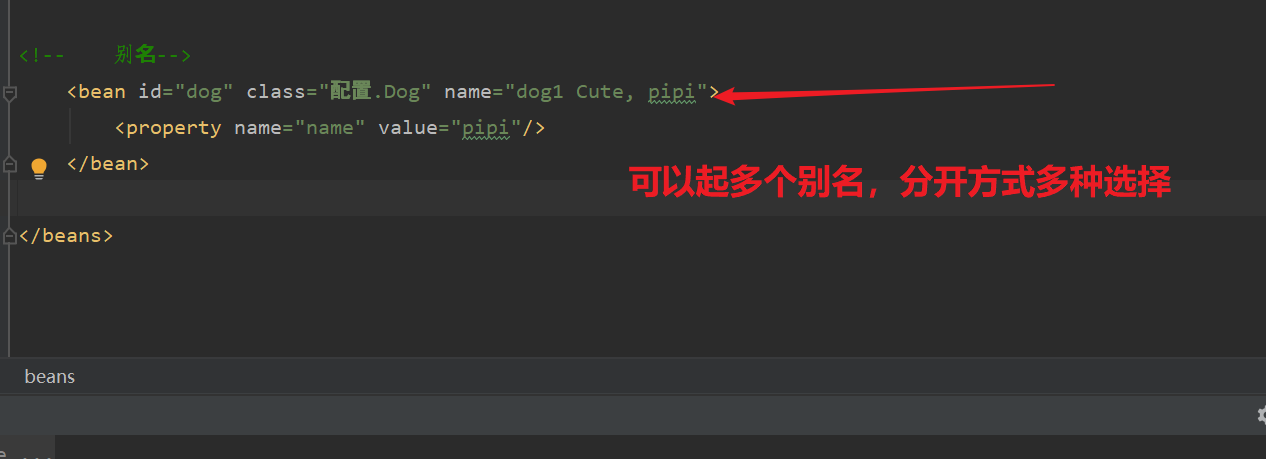Spring入门配置 Spring入门配置和DL依赖注入实现图解
贝加尔湖畔╭ 人气:01、Spring入门配置
1.1、起别名
给项目起别名
 !
!
1.2、import
导入其他xml

1.3、Bean的配置最重要的,又很多配置,我们先学一点

2、依赖注入(DL)
很重要
2.1、set注入
三种方式:
<?xml version="1.0" encoding="UTF-8"?>
<beans xmlns="http://www.springframework.org/schema/beans"
xmlns:xsi="http://www.w3.org/2001/XMLSchema-instance"
xsi:schemaLocation="http://www.springframework.org/schema/beans
https://www.springframework.org/schema/beans/spring-beans.xsd">
<bean id="student" class="bing.pojo.Student">
<!-- Set注入-->
<property name="name" value="小冰"/>
<!-- 引用注入,address-->
<property name="address" ref="address"/>
<!-- 数组注入-->
<property name="advantages">
<array>
<value>帅</value>
<value>情商高</value>
<value>智慧</value>
<value>沉稳</value>
<value>有钱</value>
</array>
</property>
<!-- set-->
<property name="course">
<set>
<value>赚钱</value>
<value>情商</value>
<value>心理学</value>
<value>经济学</value>
<value>哲学</value>
<value>英语</value>
<value>数学</value>
<value>计算机</value>
</set>
</property>
<!-- map注入-->
<property name="grades">
<map>
<entry key="java" value="10000"/>
<entry key="math" value="200"/>
<entry key="English" value="300"/>
<entry key="psychology" value="400"/>
</map>
</property>
</bean>
<bean id="address" class="bing.pojo.Address">
<property name="address" value="大亳州"/>
</bean>
</beans>
记住这些类型的注入就行了
2.2、构造器注入
<?xml version="1.0" encoding="UTF-8"?>
<beans xmlns="http://www.springframework.org/schema/beans"
xmlns:xsi="http://www.w3.org/2001/XMLSchema-instance"
xsi:schemaLocation="http://www.springframework.org/schema/beans
https://www.springframework.org/schema/beans/spring-beans.xsd">
<bean id="user" class="bing.User">
<!-- 第一种方式:通过index获取-->
<constructor-arg index="0" value="bingbing"/>
</bean>
<bean id="student" class="bing.Student">
<!-- 方式二:通过key value-->
<constructor-arg name="gender" value="小仙女"></constructor-arg>
<constructor-arg name="age" value="19"/>
</bean>
<bean id="student2" class="bing.Student">
<!-- 方式三:通过 类型获取,不推荐可能会出现歧义比如两个String-->
<!-- 这里以及上面为什么使用全类名? 肯定用到了反射-->
<constructor-arg type="java.lang.String" value="女"/>
<constructor-arg type="int" value="18"/>
</bean>
<bean id="teacher" class="bing.Teacher">
<!-- 我们来试一下两个String类型会发生什么情况-->
<constructor-arg type="java.lang.String" value="girl"/>
<constructor-arg type="java.lang.String" value="刘老师"/>
</bean>
<!-- 相当于new对象,对象名为person,只有这一个对象-->
<bean id="person" class="bing.Person">
</bean>
</beans>
注意:我们一般选用 key value注入,见名知意
2.3、拓展注入
为了简化我们可以引入p/c命名空间
使用方式:
<?xml version="1.0" encoding="UTF-8"?>
<beans xmlns="http://www.springframework.org/schema/beans"
xmlns:xsi="http://www.w3.org/2001/XMLSchema-instance"
xmlns:p="http://www.springframework.org/schema/p"
xmlns:c="http://www.springframework.org/schema/c"
xsi:schemaLocation="http://www.springframework.org/schema/beans
https://www.springframework.org/schema/beans/spring-beans.xsd">
<!-- p,命名空间,p本质上是什么? 就是properties,可以给简单的属性命名,目的是为了简化-->
<bean id="user" class="bing.pojo.User" p:name="zhangsan" p:age="18">
</bean>
<!-- c命名空间,怎么用? 是给constructor 构造器初始化的,这里就要求必须要有有参构造-->
<bean id="user2" class="bing.pojo.User" c:name="bingbing" c:age="19" p:age="20"/>
</beans>
注意点:
使用前要导入:
xmlns:p="http://www.springframework.org/schema/p"
xmlns:c="http://www.springframework.org/schema/c"
类比:
p相当于标签:properties 其实就是set注入,不过可以简化简单的操作
c详单与 :constructor:就是用来给有参构造器初始化的
2.4、bean标签作用域
bean是什么?就是一个对象,也就是类的实例
我们可以给他设置单例模式等等

单例模式
<bean id="accountService" class="com.something.DefaultAccountService"/>
<!-- the following is equivalent, though redundant (singleton scope is the default) -->
<bean id="accountService" class="com.something.DefaultAccountService" scope="singleton"/>
原型模式
<bean id="accountService" class="com.something.DefaultAccountService" scope="prototype"/>
加载全部内容